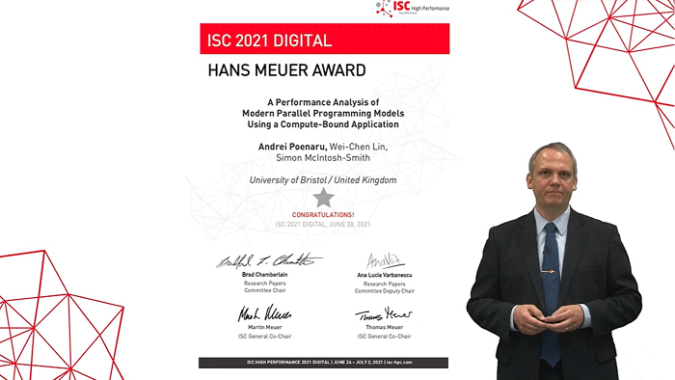Each year, the ISC High Performance Conference bestows a number of prestigious awards that recognize research excellence in high performance computing. Although ISC was held in virtual space for the second year on account of the pandemic, the tradition continued as part of the opening proceedings, hosted by Martin Schultz, professor at Technical University of Munich and this year’s ISC Program Chair.
After introducing ISC 2021 Digital and welcoming everyone to the event, Schultz turned his attention to this year’s winners.
Hans Meuer Award

The Hans Meuer Award honors the most outstanding technical paper submitted to the conference’s program. The award was introduced in 2015 in memory of the late Dr. Hans Meuer, general chair of the ISC conference from 1986 through 2014, and co-founder of the Top500 project. This year, the winner of the Hans Meuer Award receives a cash prize of 3,000 Euros and an award certificate.
This 2021 award went to Andrei Poenaru and co-authors Wei-Chen Lin and Simon McIntosh-Smith (all from the University of Bristol) for their paper: A Performance Analysis of Modern Parallel Programming Models Using a Compute-Bound Application
“This year the program committee selected the best research paper based on a combination of its technical depth, realization, impact to the ISC community, and novelty,” said ISC21 research papers chair Brad Chamberlain. “The committee appreciated the study, in terms of spanning representative programming models, compilers and hardware platforms. We also considered the analysis to be timely and very relevant to the HPC community, and believe the paper provides a model to follow when comparing portable programming models via a case study.”
Poenaru, a PhD student at the University of Bristol, provides a brief summary of his paper: “We introduced a mini-app, based on a compute bound computational chemistry application developed here at the University of Bristol. It’s a molecular docking application. And what we did is we took the core kernel code and we implemented that in lots of different programming models. These range from more traditional models like of OpenMP and OpenCL to newer ones like SYCL and Kokkos, and these can target both CPUs and GPUs, so we then took that mini-app and we run across a wide range of platforms in an attempt to evaluate the performance portability of all of these programming models.”
 “We’re anticipating that the future is going to be very heterogeneous, and that means there will be all sorts of different programming languages,” said McIntosh-Smith, professor of high-performance computing at the University of Bristol. “So we’re…exploring [those] to see if they can help solve this problem of writing codes that can be both performant and portable. In this work, we’ve taken a new compute-bound application, and ported it to all these different possible interesting languages, which might help solve this problem.”
“We’re anticipating that the future is going to be very heterogeneous, and that means there will be all sorts of different programming languages,” said McIntosh-Smith, professor of high-performance computing at the University of Bristol. “So we’re…exploring [those] to see if they can help solve this problem of writing codes that can be both performant and portable. In this work, we’ve taken a new compute-bound application, and ported it to all these different possible interesting languages, which might help solve this problem.”
Coauthor Wei-Chin (Tom) Lin, a PhD student at University of Bristol, added: “The mini-app we refer to as miniBUDE has already been very useful in my previous work, where I surveyed the performance of several SYCL implementations over time to track their improvements historically. And my current work is surveying potential HPC languages, such as Rust, Julia, maybe even Scala, and I think having a compute-bound mini-app like miniBUDE will be very helpful for comparing these programming languages. And one last thing I really like about miniBUDE is that it’s a self-contained and fairly simple to port mini-app.”
Poenaru again: “The performance portability work is interesting from two perspectives. One of them is heterogeneous architectures — we’re seeing a lot of different CPUs and GPUs and other kinds of processors from a wide range of vendors, and it’s really in everyone’s advantage to be able to program as many of those as uniformly as we can. That’s why we’re interested in APIs that are not vendor proprietary but you can use them on a wide range of different platforms.
“And the other perspective is programming languages. In other areas of software development, new languages have made big improvements over the past decades but in HPC, we’re still using older languages and frameworks so I really want to see new C++ based modern approaches to parallel programming because I think it will greatly improve the productivity of programmers working in HPC,” said Poenaru.
The team’s work was done on the GW4 Alliance’s Isambard 2 system, composed of Cray, HPE and Arm technology.
If you are registered for the ISC-HPC Digital event, you can view their research paper presentation here.
A video interview with the authors is available to conference attendees, here.
ISC Research Poster Award
Want to know more about ISC’s Research Paper program? Watch this short video:



























































